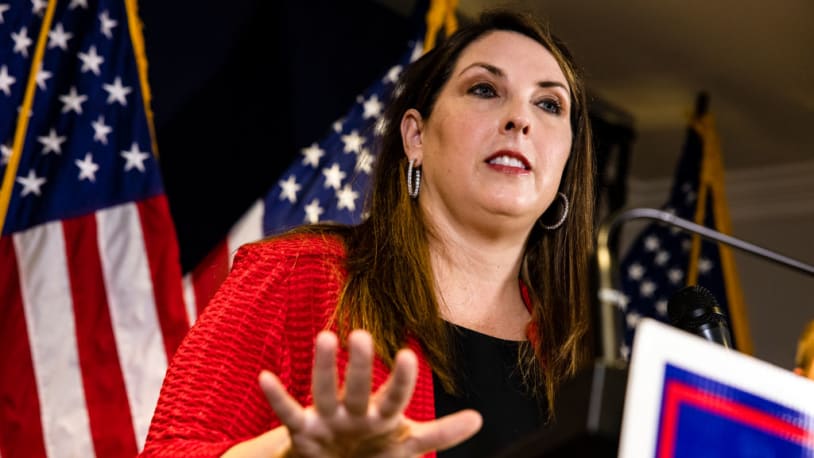
RNC’s Jan. 6 ‘legitimate political discourse’ language was added to censure in ‘routine editing decision’
Congressional Republicans spent much of Tuesday fielding questions — or ducking them — about a Republican National Committee censure resolution that accused Reps. Liz Cheney (R-Wyo.) and Adam Kinzinger (R-Ill.) of helping the House Jan. 6 committee persecute “ordinary citizens engaged in legitimate political discourse.”
Senate Minority Leader Mitch McConnell (R-Ky.) on Tuesday became the highest-ranking Republican to criticize the censure, calling it both an inappropriate GOP-on-GOP attack and a gross mischaracterization of what happened at the Capitol on Jan. 6. “We saw it happen,” he told reporters. “It was a violent insurrection for the purpose of trying to prevent the peaceful transfer of power after a legitimately certified election.”
Other Senate Republicans criticized the RNC censure as a politically damaging distraction. Sen. Mitt Romney (R-Utah), an uncle of RNC chairwoman Ronna McDaniel, said the censure “could not have been a more inappropriate” message. “Anything that my party does that comes across as being stupid is not going to help us,” he added.
Inside the RNC, “the resolution has led to an intensive round of finger-pointing,” The New York Times reports. The original draft of the resolution, written by Trump ally David Bossie, sought to eject Cheney and Kinzinger from the House GOP caucus, accusing them of helping attack “nonviolent and legal political discourse.”
“It is unclear how the words ‘legitimate political discourse’ came to enter the document as it was edited in Salt Lake City by Bossie, McDaniel, and others,” The Washington Post reports. A person familiar with the drafting “attributed the revision to a routing editing decision,” the Times adds.
“McDaniel and some of her senior staff began trying to clean up what several allies and advisers viewed as a major blunder on Saturday morning,” the Post reports. She defended censuring Cheney and Kinzinger in a Townhall op-ed Tuesday, blaming “media outlets” for “bad faith” and dishonest “cheap political stunts” by “pretending” the RNC believes violence is “legitimate political discourse.”
New Jersey’s Bill Palatucci was one of the RNC members who complained that the text of the resolution was emailed to members at 1:38 a.m. and not read aloud before the quick voice vote nine hours later. “The authors of the resolution and the leadership at the RNC have nobody to blame but themselves,” he told the Times, adding that in his view, the resolution excused “anyone who participated in the riot on Jan. 6.”
Congressional Republicans spent much of Tuesday fielding questions — or ducking them — about a Republican National Committee censure resolution that accused Reps. Liz Cheney (R-Wyo.) and Adam Kinzinger (R-Ill.) of helping the House Jan. 6 committee persecute “ordinary citizens engaged in legitimate political discourse.” Senate Minority Leader Mitch McConnell (R-Ky.) on Tuesday became the highest-ranking Republican…
Congressional Republicans spent much of Tuesday fielding questions — or ducking them — about a Republican National Committee censure resolution that accused Reps. Liz Cheney (R-Wyo.) and Adam Kinzinger (R-Ill.) of helping the House Jan. 6 committee persecute “ordinary citizens engaged in legitimate political discourse.” Senate Minority Leader Mitch McConnell (R-Ky.) on Tuesday became the highest-ranking Republican…